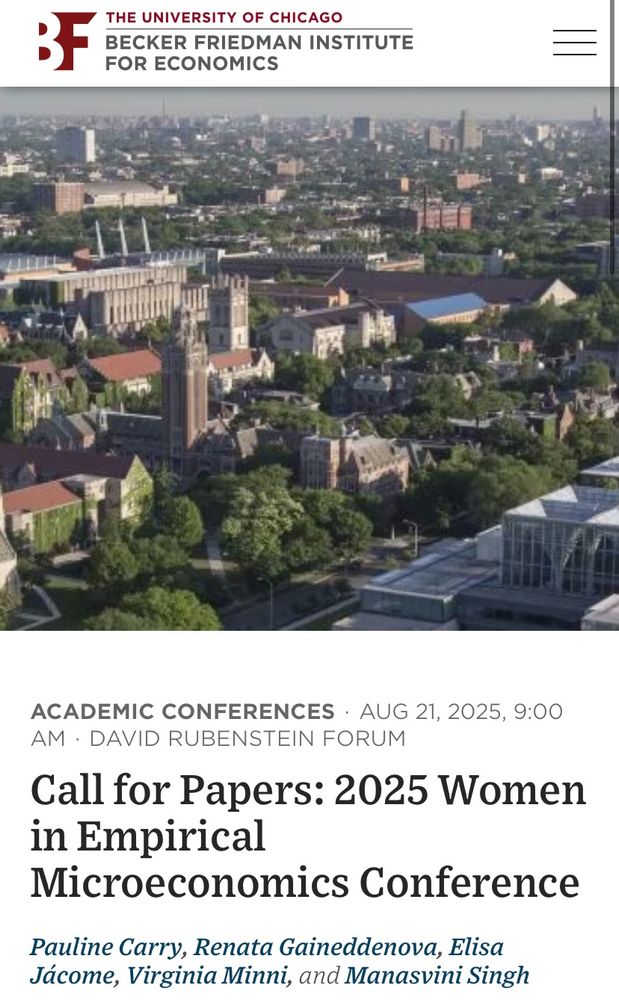
PREDOC RECRUITMENT @princetonecon.bsky.social
Come work with us at the Industrial Relations Section for AY 2026-27!
Apply here and register for information session: irs.princeton.edu/senior-resea...
@paulinecarry.bsky.social
Labor economist at Princeton University. https://www.paulinecarry.com

PREDOC RECRUITMENT @princetonecon.bsky.social
Come work with us at the Industrial Relations Section for AY 2026-27!
Apply here and register for information session: irs.princeton.edu/senior-resea...

Working Paper graphic for Pauline Carry's new paper "Location Effects or Sorting? Evidence from Firm Relocation." NBER, Working paper 33779, May 2025.
Professor Pauline Carry (@paulinecarry.bsky.social) has a new working paper in @nber.org. Carry and her co-authors, @bennykleinman.bsky.social & @elionimier.bsky.social, explore why wages in cities like New York or Paris are higher than in others.
bit.ly/3YXlty6
New paper with @bennykleinman.bsky.social & @elionimier.bsky.social !
- 4% of establishments relocate each year (FRA & US).
- Using those relocations, we find that “location effects” explain only 2-5% of spatial wage disparities.
Summary below!

Image showcasing four new faculty members at Princeton Economics, named Simon Jäger, Pauline Carry, Kevin Dano, and Fedor Sandomirsky, with welcoming text above and the Princeton Economics logo below.
This spring, Princeton Economics welcomed four new faculty members!
Simon Jäger
Pauline Carry
Kevin Dano
Fedor Sandomirskiy
From labor markets to econometric design, we're thrilled to have their cutting-edge research shaping our community.
Read more: bit.ly/4izsgVu

Image of an interior of a modern building with multiple levels, displaying a digital poster of a Princeton University working paper titled "Voluntary minimum wages: The local effects of national retailer policies" by Ellora Derenoncourt. Several individuals are seated at tables, working on laptops in this quiet, spacious environment.

Interior of a modern building with multiple people engaged in various activities. A large poster titled "WORKING PAPER, Conflict in Dismissals" by Pauline Carry from Princeton University, Industrial Relations Section #660, is prominently displayed.
Two new working papers from our faculty are available: "Voluntary Minimum Wages" by Ellora Derenoncourt (bit.ly/40zYmJH) and "Conflict in Dismissals" by Pauline Carry (bit.ly/42DN4Xx). These papers explore key labor market trends and analyze employer-employee dynamics.
30.01.2025 16:48 — 👍 7 🔁 2 💬 0 📌 0
Submit your papers to the Women in Empirical Micro Conference @beckerfriedman.bsky.social, August 21-22!
Info here: bfi.uchicago.edu/events/event...
Please submit by Feb 28.
Draft available here: drive.google.com/file/d/1G5wG...
19.12.2024 16:32 — 👍 2 🔁 0 💬 0 📌 0
The majority of personal dismissals is distorted by deliberate cost seeking. Ans this extends beyond the choice of the separation mode.
9/9

We confirm that dismissals are much more likely to end as SMAs in cooperative contexts.
Example: when workers can receive UI 3 years as a bridge into retirement.
8/9

Mechanism 3: firms and workers have asymmetric beliefs about labor court outcomes after a dismissal.
(= disagreement on probability to win in cout or the amount).
7/9
Mechanism 2: dismissals are used as a discipline device
(= employers choose to impose costly punitive dismissals to foster incentives with remaining employees).
6/9
Mechanism 1: hostility between employers and employees
(= one of the parties is willing to lose some money for the other to incur a cost).
5/9

To elicit the mechanisms, we surveyed HR directors.
In 63% of dismissals, the reason is conflict (= deliberate cost seeking). Without conflict, 67% of dismissals would end as SMAs, instead of 12%.
We find 3 main drivers:
4/9

Yet, we find that only 12% of personal dismissals end as SMAs
—> in 88% of dismissals, the employer and the worker do not minimize separation costs.
WHY?
3/9

We use the opportunity to replace a personal dismissal by a cheaper «separation by mutual agreement» (SMA) in France.
Introduced in 2008, SMAs eliminate red tape costs of EPL, preclude litigation, and allow severance pay bargaining.
=> Dismissals should end with SMAs.
2/9
How do employers and workers behave during dismissals?
In a new paper with @schoefer.bsky.social, we test between cooperation and deliberate imposition of costs.
Summary 🧵:
1/9

Send your labor papers and come present at Princeton!
Deadline is Dec 22.
irs.princeton.edu/news/2024/nl...